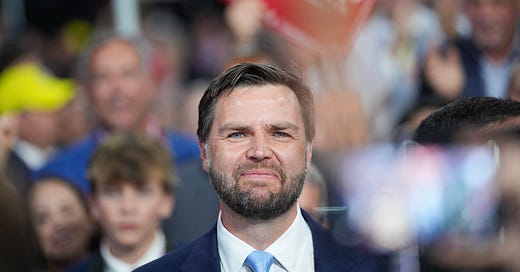How Catholic Integralism Became Just Another “-ism” in the New Right’s Firmament
Catholic Integralism has morphed from a reactionary political creed into a melting pot of populist policies that has become increasingly influential within the GOP

About a decade ago, Catholic integralism—the idea that Roman Catholic doctrine and teachings should be the basis for law and social policy—re-emerged on the American right. It had lain dormant since Catholic conservative heavyweights Brent Bozell and William F. Buckley split in the 1960s over the proper role of the church in American politics.
Integralism’s most recent incarnation was sparked by a lecture given by Oxford philosopher Thomas Pink in 2012, in which he made the case that at the time of the Second Vatican Council the Catholic Church had lost touch with its own self-understanding as a political entity with rights over the baptized. Pink’s thesis was intended to spark a theological debate over the proper relationship between the church and the state.
By 2016, however, the discussion had moved from academic salons to become the basis of an alternative political movement in a fracturing American polity. The idea of “neo-integralism” was picked up by a handful of American Catholic professors and writers—including University of Notre Dame political scientist Patrick Deneen (author of the bestseller “Why Liberalism Failed”), Harvard University law professor Adrian Vermeule, Catholic University theologian Chad Pecknold, political theorist Gladden Pappin and journalist Sohrab Ahmari.
Their main contention was that the Enlightenment ideas upon which the country was founded had failed to stop the social pathologies that were on course to damage and ultimately destroy American society. They called for a new American creed built explicitly upon Catholic foundations. Shortly after coalescing, the movement rebranded itself as “postliberalism” to shed the baggage of European integralism, with its right-wing variants in Franco’s Spain and the French neo-monarchist group Action Francaise.
What followed were essays, interviews and books co-opting Catholic social thought and using it as an ideological battering ram to attack the basis of American government and the free market economy. More specifically, they argued, the problem was that our social, cultural and economic problems are the result of enshrining Lockean individualism and Smithian self-interest over the pursuit of “the common good.” The solution was to advance a new class of leaders who would infuse our institutions with laws and regulations shaped by Thomistic scholasticism, communitarianism and the legal theories of the late German political philosopher (and Nazi jurist) Carl Schmitt.
Toggling between high vision and low policy, the postliberal neo-integralists were roundly criticized for delivering “an unserious Catholic politics.” Their grand vision was dismissed as a bewildering proposition for a historically Protestant and rapidly secularizing United States. Their policy ideas—reviving unionism, trade protectionism and pro-family subsidies, and reinstituting Sabbath laws—offered a combination of the ordinary and underexamined. Their “inhabit-the-institutions” tactics rang of soft authoritarianism.
What remains of postliberal Catholic neo-integralism? Shed of the “high-Church aesthetics,” its seeds have been scattered into the soil of the New Right—which has emerged in the last decade as an ideological challenger to Reaganism, which emphasizes free markets and a hawkish foreign and defense policy. Catholic postliberalism now resides on the American right alongside economic populism, Protestant integralism and national conservatism. Together they are shaping a new generation of conservatives who favor protectionist economic policies, foreign policy isolationism and authoritarian legal theories, all in the name of fighting the culture war on behalf of the middle and working classes.
The populist religious right’s standard-bearer, according to Matthew Schmitz, editor of Compact Magazine, is Ohio senator and now GOP vice presidential candidate J.D. Vance. Vance, who calls himself part of the “postliberal right,” offers what he terms a “serious populism” that will reshape the GOP by shifting to the left on economic issues. He proposes a domestic spending and industrial policy agenda that includes constraining corporations via regulations and vigorous antitrust enforcement, reshoring American manufacturing, and disengaging from global economic and military commitments.
Vance and his congressional allies have promised to bring back “good jobs and fair wages” with industrial policy. For instance, Vance joined Sen. Josh Hawley (R-Mo.) and Sen. Marco Rubio (R-Fla.) to make common cause with the Biden administration and oppose the merger of Nippon Steel and U.S. Steel, citing national security concerns.
On cultural issues, the New Right blends Christian morality with the language of the social Gospel. In a nod to Notre Dame’s Deneen, Vance warns of a two-front war by elites against middle America, arguing that “the culture war is a class war.” In this framing, jobs are shipped to China to benefit global elites, who flood the market with addictive products from fentanyl to cultural Marxism. In this worldview, “woke ideology” is the fruit of an unholy marriage between corporations and governments. The remedy is to punish Big Tech via antitrust laws and use tax legislation to disincentivize mergers. This last set of remedies is one reason why Vance, Hawley and others have praised activist Democratic officials like Federal Trade Commission Chairwoman Lena Khan and Securities and Exchange Commission Chairman Gary Gensler.
This leftward tilt on economic policy within the GOP also bears the mark of postliberal journalist Ahmari, who mixes Marxism, Hungarian economist Karl Polanyi’s critique of “liberal capitalism,” and European social democracy to call for a revival of unionism and regulated markets that “serve families”—rhetoric that has been adopted by some “common good” conservative politicians, including Vance, Hawley and Rubio.
But more significant than its embrace of subsidies, tariffs and taxes is the New Right’s willingness to take inspiration from foreign illiberal movements. This includes a robust defense of Viktor Orban’s Hungary as a model for America, where the ruling Fidesz party increasingly regulates academia and the media. Looking eastward for “law and order” regimes to model tracks with the New Right’s growing comfort with “the common good justifies the means” thinking, ideas all traceable to the postliberal integralists.
In his 2022 book “Common Good Constitutionalism,” Vermeule reimagines the American constitutional system as a vehicle for wise leaders to make laws that promote the common good. Judges are to defer to the administrative state’s mandate to use the law to form moral citizens. Vermeule’s ideal paradoxically merges Catholic natural law with the Chinese Communist Party’s administrative system.
Echoes of this can be detected in advice Vance gave to the man who may be about to become his boss, Donald Trump, in 2022. If reelected, Vance counseled the former president, don’t worry about the Constitution, and fire and replace the bureaucrats and civil servants. And when the Supreme Court says stop, channel Andrew Jackson and “stand before the country and say, ‘the chief justice has made his ruling; now let him enforce it.’”
At the same time Vance and others are advocating for the defenestration of our courts, a new generation of conservative legal scholars is searching for an alternative to the doctrine of judicial originalism and building a new legal theory—common good constitutionalism—as a means of advancing conservative policy via the judiciary.
Perhaps ironically, what began as a misguided appeal on the part of a handful of American academics for the restoration of an idealized Catholic order has been diluted into a melting pot of policies and politics that bear little resemblance to authentic Catholic social thought and teaching. For example, Vance’s support for the abortion pill, mifepristone, has been cited as a compromise of his principles and faith. Other commentators note that postliberals violate the Catholic social thought’s bottom-up principle of subsidiarity by elevating the state’s power over the rights of persons and families.
Given the secular trends in the United States, integralism is unlikely to gain much purchase in the way its most idealistic advocates imagine and has instead emerged as nothing more than populist policies dressed up in the language of religion. However, this new populist version definitely bears watching as it has already found a place in the ferment of the New Right and, with the choice of Vance as Trump’s running mate, potentially within the very heart of the Republican Party.





